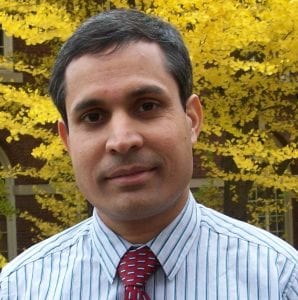Indian Viewpoints on Conflict Resolution Focus of Two New Books

The enduring legacy of non-violent conflict resolution championed by two prominent Indian thinkers is the focus of two new books by Adjunct Professor Debidatta Aurobinda Mahapatra, Ph.D.
The first is titled “Gandhi and the World,” and it explores the question: “Is it possible to generate Gandhian optimism in nonviolent methods to address conflicts in the contemporary world?” The book argues that if Gandhi could change the course of history in a nonviolent way and influence leaders like Martin Luther King, Jr., there must be elements in his thought and action,that need re-examination in the 21st Century world.
The book on Sri Aurobindo, “The Philosophy of Sri Aurobindo: Indian Philosophy and Yoga in the Contemporary World,” presents an in-depth exploration of his evolutionary philosophy. The book chapters discuss his vision of human unity, shed light on his integral yoga and offer a comprehensive view of his concept of ethics, as well as his metaphysics of consciousness. They explore how his philosophy illuminates some of the fundamental problems of our times and offers possible solutions.
Mahapatra’s areas of research are conflict resolution and international relations. His goal in organizing these interdisciplinary conferences and resultant books was to explore Indian thought and their conflict resolution potential. Though there are various approaches and theories on conflict resolution, the ideas of these two thinkers, particularly that of Aurobindo, are not adequately explored in the contemporary debates on conflict and peace, Mahapatra said.
“These two Indian thinkers offer insights to many of our contemporary problems and offer possible solutions,” Mahapatra said.
Mahapatra recommends the books for students, academics and anyone interested in Indian thought in general, and in the thoughts of Gandhi and Aurobindo. These interdisciplinary collections are relevant to the areas of conflict resolution, international relations, global south and South Asia.
